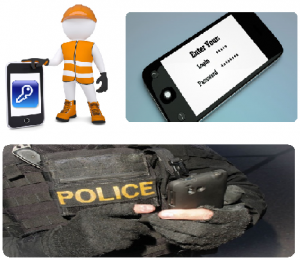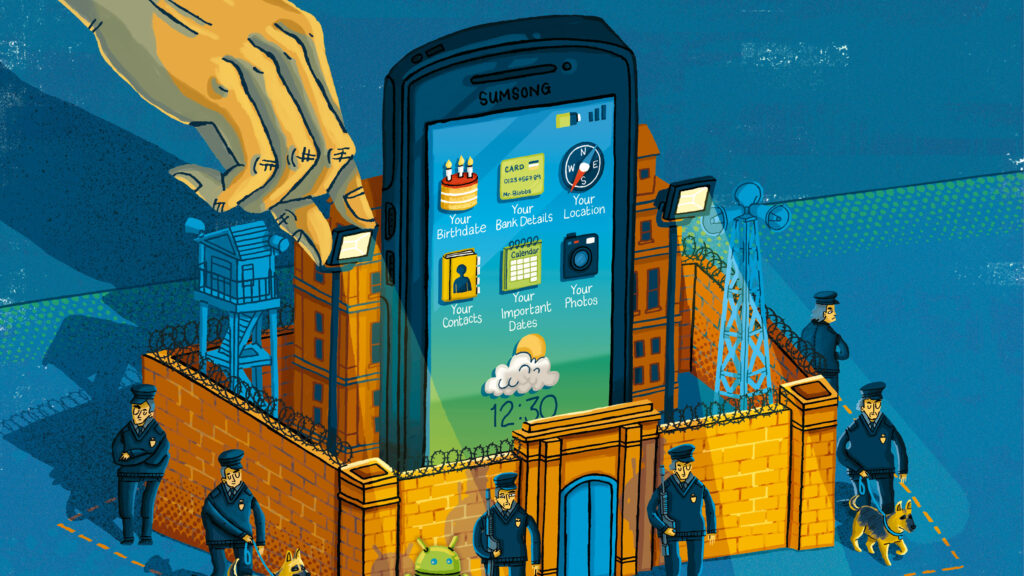How to Use Your Smartphone Safely?

In this article, I will highlight the various best practices on how to safely use your smart phone. You may not know this, but smart phones can contain a lot of personal information which can lead to theft of your identity.There are alot of issues that can also arise in case your mobile phone gets lost or stolen. Your data on smart phone is also on risk if you are using public wifi hotspots. Thus, the following are list of best practices which promote safe smart phone use.
Set a pin or password for your smart phone:
This is perhaps a no brainer and is the simplest means of securing your phone against thieves and unauthorized users. A pin or password is your first line of defense and it’s a mandatory requirement if you want to protect your privacy. Your failure to set up a pin or password can make the job an identity thieve super-easy – all your bank, credit-card and social media related passwords can be compromised without effort.
Set a pin for your SIM card:

Simply setting up an unlock pin or pattern for your smart phone is not enough, you also need to make sure that no one has access to you telephone number. Crooks can easily take out your SIM card and insert it into another phone where they’ll have access to your personal and business contacts. Additionally, thieves have also been known to make expensive phone calls which can end up costing you an arm and a leg.
Update your phone’s OS and firmware regularly:
Updating the OS and firmware is a good idea; most updates carry critical security fixes. Simply downloading these updates can save your phone from potentially devastating attacks.
Install data security software on your Smartphone:
Smart phones are engineered to be smart – and like every other smart device – it too has the capacity to store worrying amount of information, if they fall into the wrong hands – information which could also be worth a lot of money if it contains corporate related data. Consequently, smart phone users don’t have a choice other than to simply store private information on their portable devices – in fact this would defeat the purpose of smart phones. Therefore, it is essential that they do so responsibly by password-protecting their data on their Smartphone with software which can as a virtual folder lock.
Use a virtual private network:
Using a virtual private network masks your identity, making it impossible for hackers to track you down. VPN works by changing your online identity – In a nutshell – you are not what you appear to be on the internet. However, one negative aspects of using a VPN is that it can considerably slow down internet browsing speeds, so having a good VPN service is essential – especially for working professionals.
Never leave your Smartphone unattended:
Most people have a tendency of leaving their smart phones on flat surfaces without realizing the consequences of doing so. A rule of thumb to keep in mind is that: leaving your smart phone lying around in a public place such as a restaurant, café, or at the office is like leaving your social security number for everyone to see. Identity thieves are always on the lookout for such careless acts – as it’s more convenient to just pickup a Smartphone lying around then it is to physically snatch it from someone.
Download and register with a remote wipe service:
No matter how careful you are, there will be times when luck will not be by your side. Therefore, to prepare for that day, you need subscribe to a service which will allow you to remotely wipe clean your phone’s data. These services enable you to log-in online, track down your phone using GPS, and from there you have option to wipe data stored on your Smartphone’s hard drive. However, most remote wipe software are not capable of wiping the data saved on your phone’s external memory card, so it’s best to migrate your personal data into your phone’s hard-drive when using a remote wipe service.
Last Words And Suggestions!
Smartphone security is one of the most worrying problems now-a-days. Mobile users have become very conscious about the security of their smartphones and their personal data within their smart phones. There are many solutions out there but the most viable solution for smart phone data security is Folder Lock For SmartPhones.
Best Ways To Handle A Phone Safely
1. Always use a hands-free device when talking on the phone.
2. Avoid using the phone while driving, walking, or engaging in any other activity that could be dangerous.
3. Use the speakerphone option when possible.
4. Avoid holding the phone close to your body and keep it at a safe distance.
5. Avoid using the phone in areas with high levels of radiation.
Top Rules To Cell Phone Etiquette
1. Be considerate of others: Be aware of the volume of your conversation and the potential disruption it may cause to those around you.
2. Respect the privacy of others: Respect the privacy of those around you and don’t use your cell phone in areas where it is not appropriate, such as during meetings or in public places.
3. Refrain from using your phone while driving: Using a cell phone while driving is dangerous and can lead to serious consequences.
Some Good Phone Rules
1. Always turn your phone off or put it on silent during meetings, classes, performances, or other events.
2. Refrain from using your phone while driving.
3. Avoid using your phone in public places, such as libraries, restaurants, or places of worship.
4. Don’t use your phone during meals or when talking to someone.
5. Avoid making or receiving calls in places where it may be disruptive, such as on public transportation.
Rules For Using A Cell Phone At Work
1. Follow any company policies or guidelines regarding cell phone use.
2. Refrain from using your phone during meetings or other work-related activities.
3. Do not use your phone to make or receive personal calls or texts during work hours.
4. Refrain from using your phone to browse the internet or access social media sites during work hours.
5. Avoid using your phone for activities that may be distracting to others.
6. Refrain from taking pictures or videos
Essential Rules Of Phone Etiquette
1. Answer calls promptly.
2. Speak clearly and politely.
3. Listen attentively.
4. Respect the other person’s privacy.
5. Avoid making personal calls during work hours.
6. Use appropriate language.
7. Respect the other person’s time.
8. Avoid multitasking while on the phone.
9. Avoid background noise.
10. Use speakerphone only when necessary.
11. End the call politely.
What Is The 9 To 9 Rule?
The 9 to 9 rule is a rule of etiquette that suggests that one should not call someone before 9am or after 9pm. This rule is based on the idea that people should respect one another’s time, and that it is not polite to call someone at an inconvenient time.
Guidelines To Keep Devices Secure
1. Use strong passwords and two-factor authentication.
2. Regularly update your software and operating systems.
3. Install a reliable antivirus and anti-malware software.
4. Use a secure and private internet connection.
5. Avoid clicking on suspicious links or attachments.
6. Back up your data regularly.
7. Use a Virtual Private Network (VPN).
8. Disable remote access to your devices.
9. Be aware of phishing scams
Top Rules Of Internet Safety
1. Never give out personal information online.
2. Use strong passwords and two-factor authentication.
3. Don’t open emails or attachments from unknown sources.
4. Don’t respond to online bullying or harassment.
5. Use a secure and private internet connection.
6. Set parental controls and monitor your children’s online activities.
7. Be aware of phishing scams.
8. Regularly update your software and operating systems.
What Is Mobile Phone Safety?
Mobile phone safety is the practice of using your mobile phone in a safe and secure manner. This includes protecting your personal information, avoiding scams and malware, and being aware of the potential risks associated with using your mobile phone. It also includes taking steps to protect your device from theft or damage, such as using a secure passcode, setting up remote wiping, and using a virtual private network (VPN).
Best Way To Reduce The Abuse Of Mobile Phones
The best way to reduce the abuse of mobile phones is to educate users on the potential risks and dangers associated with using them. It is important to understand the importance of keeping personal information secure and avoiding scams and malware. Additionally, users should be encouraged to use secure passcodes, set up remote wiping, and use a virtual private network (VPN) to protect their device from theft or damage. Finally, users should be encouraged to be mindful of their phone usage and to take breaks from using their phone
Things That You Need To Protect Using Internet
1. Personal information such as passwords, credit card numbers, and banking details.
2. Secure passwords that are not easily guessed.
3. Antivirus and malware protection.
4. Firewalls to protect from malicious software.
5. Secure web browsing through the use of HTTPS.
6. Encryption for emails, files, and messages.
7. Secure online transactions through the use of secure payment gateways.
8. Avoiding phishing attacks by being
Methods Of Securing A Mobile Device
1. Use a secure lock screen such as a PIN, password, or pattern.
2. Enable two-factor authentication for additional security.
3. Install a reputable mobile security app to protect against malware and malicious websites.
Basic Security Requirements
1. Authentication: verifying the identity of users and systems.
2. Authorization: granting access to resources based on identity.
3. Encryption: protecting data in transit and at rest.
Key Principles Of Security
1. Confidentiality: Ensuring that information is not accessed by unauthorized individuals or entities.
2. Integrity: Ensuring that information is not modified or corrupted in an unauthorized manner.
3. Availability: Ensuring that information is accessible to authorized individuals or entities.
Make My Phone Safe For Kids
Set up parental controls: Parental controls allow you to manage the content and apps that your child can access on their phone. This can be done by setting age restrictions, blocking certain websites, and restricting in-app purchases.
